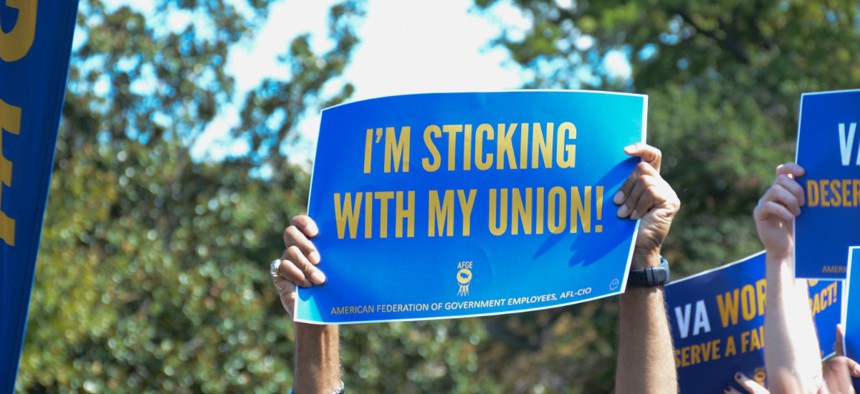
Union members rally at the Capitol on Sept. 24, 2019. Chelsea Bland / AFGE
Labor Authority Formally Proposes Rule Making It Easier for Feds to Cancel Union Dues
The agency tasked with administering federal sector labor law said it must change how federal workers cancel union dues to comply with a recent Supreme Court decision, but unions accused it of using the case as pretext to hamper labor groups.
The Federal Labor Relations Authority on Wednesday formally proposed a rule that would make it easier for federal employees to cancel their union dues.
A proposed rule scheduled for publication in the Federal Register on Thursday would begin implementation of a controversial decision by the agency that administers federal sector labor law, which already faces a legal challenge. The FLRA will accept comments on the proposal between now and April 8.
In February, the FLRA, which is a board made up of two Republican appointees and one Democrat, ruled 2-1 that it needed to change the process by which agencies collect union dues to comply with the 2018 Supreme Court decision Janus v. American Federation of State, County and Municipal Employees. In that case, the Supreme Court ruled that state and local public sector unions could no longer charge employees who do not wish to be dues-paying members with monthly “agency fees” to help cover the cost of representational work done on their behalf.
Currently, when a federal employee agrees to join a union and pay dues, they agree to be a member for a full year. Each year, federal employees who are union members have a 15-day window during which they can choose to end their membership and cease paying dues.
FLRA Chairwoman Colleen Duffy Kiko wrote last month that she believes the spirit of Janus means that federal agencies should be willing to cancel an employee’s dues at any time they wish, provided it is after the first one-year period as required by statute. The decision overturns nearly four decades of federal labor law precedent, and is controversial both within the FLRA and the broader labor community.
In a dissent to the decision last month, FLRA Member Ernest DuBester accused his colleagues of using Janus as a pretext to hurt the finances of unions. He noted that not only do federal employee unions not use the so-called “agency fees” at issue in that case, but Justice Samuel Alito, who wrote the decision, touted collective bargaining in the federal government as constitutional.
“The short answer to [OPM’s] request is that Janus requires no such reevaluation,” DuBester wrote. “Indeed, the authority’s decision here does not contain a scintilla of legal analysis connecting its conclusions to the Supreme Court’s decision. This omission is not inadvertent. Janus focuses exclusively on the constitutionality of ‘agency fee’ payments required of employees who are not members of a union to support activities germane to a union’s duties as the exclusive bargaining representative.”
Last month, the National Treasury Employees Union filed a formal petition for review of the FLRA’s decision with the U.S. Court of Appeals for the D.C. Circuit. If that legal challenge proves successful, both the February decision and the rule proposed this week would be reversed.
“The FLRA should not be allowed to upend 40 years of federal sector labor law for what appears to be an ideological attack on unions and their ability to protect the right of federal employees to collectively bargain,” said NTEU National President Tony Reardon.
In a statement, American Federation of Government Employees National President Everett Kelley accused the FLRA of engaging in "union busting."
“The decision to move forward with this proposed rule is just another in a series of activist steps the Authority has taken to advance this administration’s goal of busting unions and making it even harder for rank-and-file federal employees to speak up, defend their rights, and serve the American people," he said. "The Authority's proposed rule is contrary to both settled law and congressional intent that clearly establish that dues allotments are only revocable at yearly intervals. That they would push forward with this kind of union busting in the midst of a pandemic, while front-line federal employees like VA caregivers, airport screeners, food inspectors, and other personnel are being forced to fight the administration for basic safety protocols and personal protective equipment, is truly disgraceful.”







